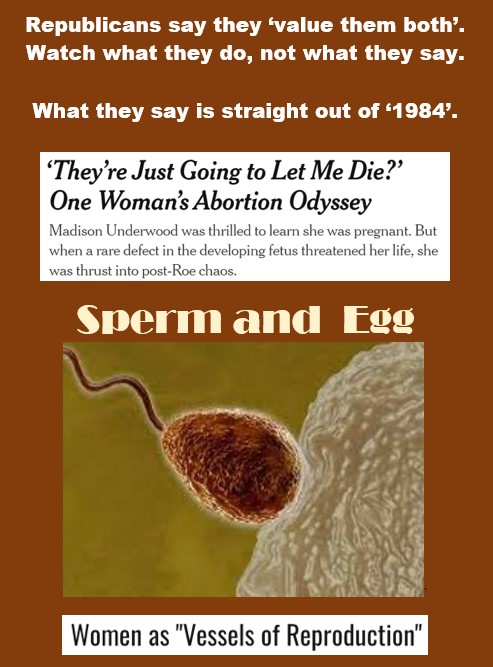Headline: New York Times, 8/5/2022
Bottom headline: Freakonomics, 9/2/2013The law’s passage came just three days after voters in Kansas, another conservative Midwestern state, overwhelmingly rejected an amendment that would have stripped abortion rights protections from their State Constitution, a result seen nationally as a sign of unease with abortion bans. And it came despite some Indiana Republicans opposing the measure for going too far, and others voting no because of its exceptions.
Related post:
Deceitful pro-sperm-and-egg organization in deep denial after crushing defeat of "Value Them Both" amendment to Kansas constitution. (8/4/20228/2/2022 update starts here
Headline: New York Times, 8/1/2022
Bottom headline: Freakonomics, 9/2/2013Madison Underwood was lying on the ultrasound table, nearly 19 weeks pregnant, when the doctor came in to say her abortion had been canceled.
Nurses followed and started wiping away lukewarm sonogram gel from her exposed belly as the doctor leaned over her shoulder to speak to her fiancé, Adam Queen.
She recalled that she went quiet, her body went still. What did they mean, they couldn’t do the abortion? Just two weeks earlier, she and her fiancé had learned her fetus had a condition that would not allow it to survive outside the womb. If she tried to carry to term, she could become critically ill, or even die, her doctor had said. Now, she was being told she couldn’t have an abortion she didn’t even want, but needed.
“They’re just going to let me die?” she remembers wondering.
7/31/2022 update starts here
Headline: Indianapolis Star, 7/30/2022
Bottom headline: Freakonomics, 9/2/2013
Saturday's vote puts Indiana on track to be one of the first states in the nation to pass new abortion restrictions after the Supreme Court struck down Roe v. Wade, the landmark case that had protected women's right to an abortion for 50 years.
A majority of Senate Republicans supported the controversial measure, despite concerns from some on the far right of the caucus that it doesn't go far enough to restrict abortion and concerns by more moderate Republicans that a zero-week ban is too strict. They voted to pass the bill with the fewest number of yes votes needed, 26-20, with no support from Democrats. [emphasis added]
7/30/2022 update starts here
Headline: Dallas Morning News, 7/27/2022
Bottom headline: Freakonomics, 9/2/2013
7/27/2022 update starts here
Headline: NPR, 7/26/2022
Bottom headline: Freakonomics, 9/2/2013
Elizabeth thought of abortion rights in broad terms: "I have said throughout my life I believe that women should have the access to the right to an abortion. I personally would never get one."
And at this particular point in her life, pregnant for the first time at age 26, it was still somewhat abstract: "I had not been put in a position to where I had to weigh the real nuances that went into this situation. I had not been put in the crossroads of this issue."
But in early May, not long after the uneventful anatomy scan, the Wellers suddenly arrived at that crossroads. There they found themselves pinned down, clinically and emotionally, victims of a collision between standard obstetrical practice and the rigid new demands of Texas law. [emphasis added]
7/26/2022 update, "Indiana edition", starts here
Top headline: CNN, 7/25/2022
Bottom headline: Freakonomics, 9/2/2013
The GOP-authored bill would also bar abortion clinics from performing surgical abortions and require in-person dispensation of an abortion-inducing drug used in a medication abortion. It would include exceptions in cases of rape or incest so long as the pregnant person provides the physician with an affidavit attesting to the rape or incest.
The state Senate Rules and Legislative Procedure Committee meeting featured extensive public debate, with dozens of individuals, from doctors to faith leaders to private citizens, voicing their opinions on the bill. While some opposed the legislation for the limitations it places on abortion, other opposed what they described as vague language and the proposed exceptions in the measure.
Original 7/24/2022 post, "Texas GOP edition", starts here
Top headline: The Texas Tribune, 7/20/2022
Bottom headline: Freakonomics, 9/2/2013
Excerpt from The Texas Tribune:
Abbott’s statement neglected to mention that Texas lags behind at least 33 states, including 11 led by Republican governors, as well as the District of Columbia, all of which have already expanded or are working with the federal government to extend postpartum Medicaid benefits for a full year after giving birth. In 2021, the Texas House passed a measure that would have lengthened that coverage to 12 months, but during the waning days of the legislative session one of the senators who co-authored the state’s restrictive abortion law halved the time period.
Texas is among a dozen states that have also declined to expand broader Medicaid coverage under the Affordable Care Act to additional people with low incomes, leaving it with some of the strictest eligibility requirements in the country. For example, single parents with one child must earn $196 or less a month to qualify. [emphasis added]
Related post:
This is what Republicans have in store if Democrats can't get out the vote this fall. (7/23/2022)







No comments:
Post a Comment